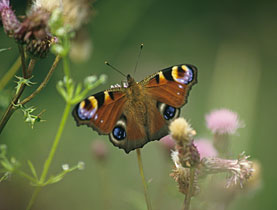
GMO studies fail to produce definitive answers

Genetically modified organisms (GMOs) have no negative impact on bees, worms, snails or fly larvae, according to a national research programme.
But experts say there is no standard definition of what is considered “damage to the environment”. All sides in the debate agree there is more work to be done.
“This is a good start, these results from this first exploration,” Maya Graf, a Green Party parliamentarian, told swissinfo.
“It is clear though that further exploration is necessary to answer the open questions.”
The findings that were presented by the Federal Environment Office on Tuesday are part of a series of eight studies into biosafety in non-human gene technology.
The Environment Office said the research is aimed at ensuring the authorities have suitable methodology for the monitoring of GMOs in the environment and so that the long-term impact of GMOs can be recognised in time.
A ban on growing GMOs in Switzerland runs out in 2010. Outdoor GM crops for scientific purposes are allowed but are subject to approval.
A second national research priority programme on biosafety will be completed by 2011.
Wild bees
Research on wild bees showed that it is highly unlikely genetically modified crops currently being cultivated will affect individual bees adversely, according to researchers from the Federal Institute of Technology in Zurich and Lausanne University.
The effect on the development of harmful insects was investigated in GM, scab-resistant apples.
Researchers observed an impact but said it reflected natural differences between apple varieties.
Dirk Babendreier, a Swiss-based researcher with CABI Europe, a non-profit scientific and information clearing house, says the existing body of evidence on what effect GMOs have on bees – a vital link in plant and crop regeneration – is incomplete.
“So far, only honey bees and to some degree, bumblebees were assessed at all,” he told swissinfo. “Solitary bees are a very important group of pollinators and so far have been completely neglected in risk assessment.”
If the solitary bee – there are 700 species in Europe alone – were affected by GMOs, it would have serious effects on crops and wild plants, according to Babendreier.
“All kinds of plants may not be pollinated any more. No reduction would be possible and many plants would basically die,” he said.
“In terms of crop issues, it might be that the harvest is simply decreasing.”
He believes that GMOs can effectively reduce the amount of pesticides, herbicides and other poisons currently used to treat crops.
Ethics of risk
The question still unanswered is whether it is worth the trade-off. Risks need to be assessed “as thoroughly as we can afford,” he said.
Another group of researchers led by Klaus Peter Rippe of the Federal Commission on Ethics for non-human biotechnology examined the debate about the ethics of risk.
They concluded that environmental monitoring, required by law, might not provide solid data to reach decisions on GMOs. Such monitoring was also costly and time consuming.
“Neither a strong precautionary principle nor a simple cost/benefit analysis is adequate for assessing the release of GMOs,” said a statement by the Environment Office.
Other studies focused on the soil ecosystem and the early detection of unexpected environmental impacts.
swissinfo, Justin Häne and agencies
In 2005 Swiss voters accepted a proposal for a five-year blanket ban on genetically modified organisms (GMOs) in Swiss agriculture.
The result forced the Swiss government to put in place some of the toughest legislation on GMOs in Europe.
The European Union, of which Switzerland is not a member, ended a six-year moratorium on accepting applications for new genetically modified foods in 2004.
Germany and France, two of Switzerland’s neighbours, have both voted to uphold national bans on products they deem unsafe.
Spain is the only EU country that has been growing GMOs (GM maize) in any significant quantities. Otherwise, the EU remains largely GMO-free.

In compliance with the JTI standards
More: SWI swissinfo.ch certified by the Journalism Trust Initiative




























You can find an overview of ongoing debates with our journalists here . Please join us!
If you want to start a conversation about a topic raised in this article or want to report factual errors, email us at english@swissinfo.ch.